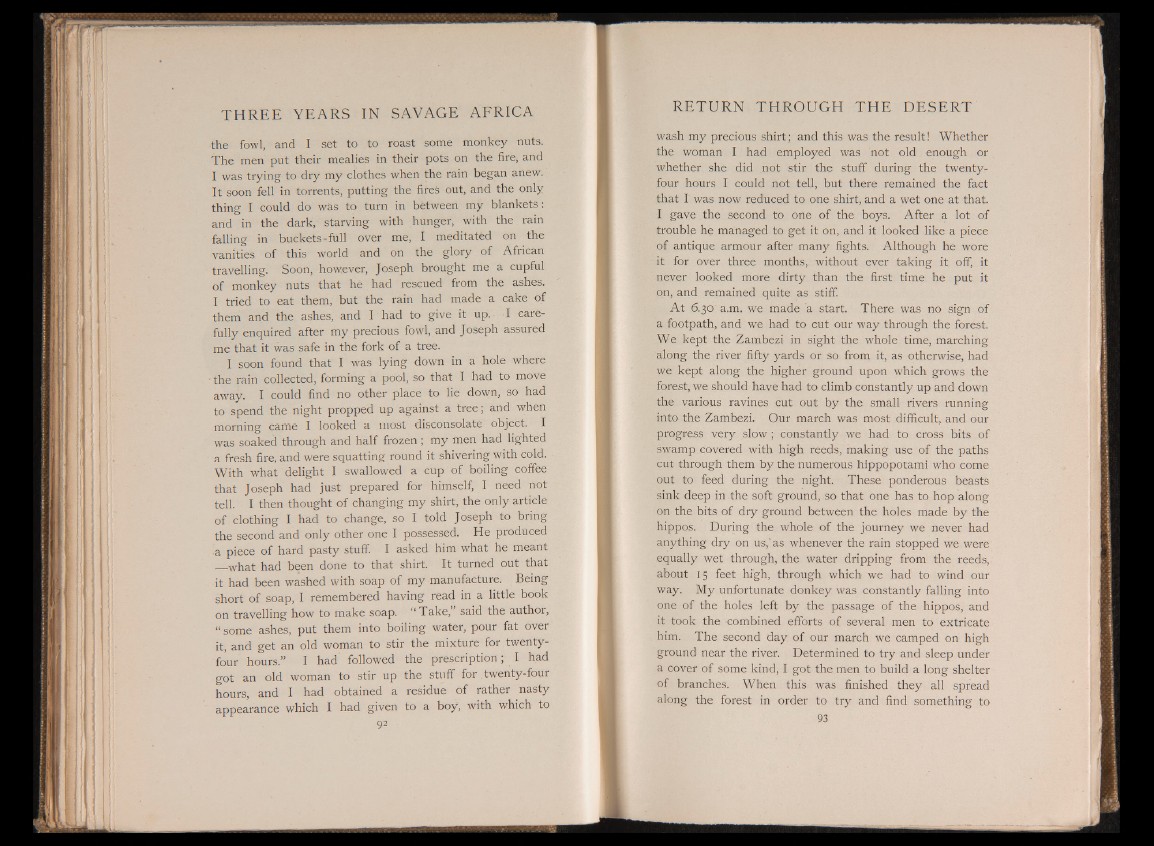
the fowl, and I set to to roast some monkey nuts.
The men put their mealies in their pots on the fire, and
I was trying to dry my clothes when the rain began anew.
It soon fell in torrents, putting the fires out, and the only
thine I could do was to turn in between my blankets• :
and in the dark, starving with hunger, with the ram
falling in buckets-full over me, I meditated on the
vanities of this world and on the glory of African
travelling. Soon, however, Joseph brought me a cupful
of monkey nuts that he had rescued from the ashes.
I tried to eat them, but the rain had made a cake of
them and the ashes, and I had to give it up. I carefully
enquired after my precious fowl, and Joseph assured
me that it was safe in the fork of a tree.
I soon found that I was lying down in a hole where
the rain collected, forming a pool, so that I had to move
away. I could find no other place to lie down, so had
to spend the night propped up against a tree ; and when
morning came I looked a most disconsolate object. I
was soaked through and half frozen ; my men had lighted
a fresh fire, and were squatting round it shivering with cold.
With what delight I swallowed a cup of boiling coffee
that Joseph had just prepared for himself, I need not
tell. I then thought of changing my shirt, the only article
of clothing I had to change, so I told Joseph to bring
the second and only other one I possessed. He produced
a piece of hard pasty stuff. I asked him what he meant
what had been done to that shirt. It turned out that
it had been washed with soap of my manufacture. Being
short of soap, I remembered having read in a little book
on travelling how to make soap. “ Take,” said the author,
“ some ashes, put them into boiling water, pour fat over
it, and get an old woman to stir the mixture for twenty-
four hours.” I had' followed the prescription ; I had
got an old woman to stir up the stuff for twenty-four
hours, and I had obtained a residue of rather nasty
appearance which I had given to a boy, with which to
92
wash my precious shirt; and this was the result! Whether
the woman I had employed was not old enough or
whether she did not stir the stuff during the twenty-
four hours I could not tell, but there remained the fact
that I was now reduced to one shirt, and a wet one at that.
I gave the second to one of the boys. After a lot of
trouble he managed to get it on, and it looked like a piece
of antique armour after many fights. Although he wore
it for over three months, without ever taking it off, it
never looked more dirty than the first time he put it
on, and remained quite as stiff.
At 6.30' a.m. we made a start. There was no sign of
a footpath, and we had to cut our way through the forest.
We kept the Zambezi in sight the whole time, marching
along the river fifty yards or so from it, as otherwise, had
we kept along the higher ground upon which grows the
forest, we should have had to climb constantly up and down
the various ravines cut out by the small rivers running
into the Zambezi. Our march was most difficult, and our
progress very slow; constantly we had to cross bits of
swamp covered with high reeds, making use of the paths
cut through them by the numerous hippopotami who come
out to feed during the night. These ponderous beasts
sink deep in the soft ground, so that one has to hop along
on the bits of dry ground between the holes made by the
hippos. During the whole of the journey we never had
anything dry on us,’ as whenever the rain stopped we were
equally wet through, the water dripping from the reeds,
about 15 feet high, through which we had to wind our
way. My unfortunate donkey was constantly falling into
one of the holes left by the passage of the hippos, and
it took the combined efforts of several men to extricate
him. The second day of our march we camped on high
ground near the river. Determined to try and sleep under
a cover of some kind, I got the men to build a long shelter
of branches. When this was finished they all spread
along the forest in order to try and find something to